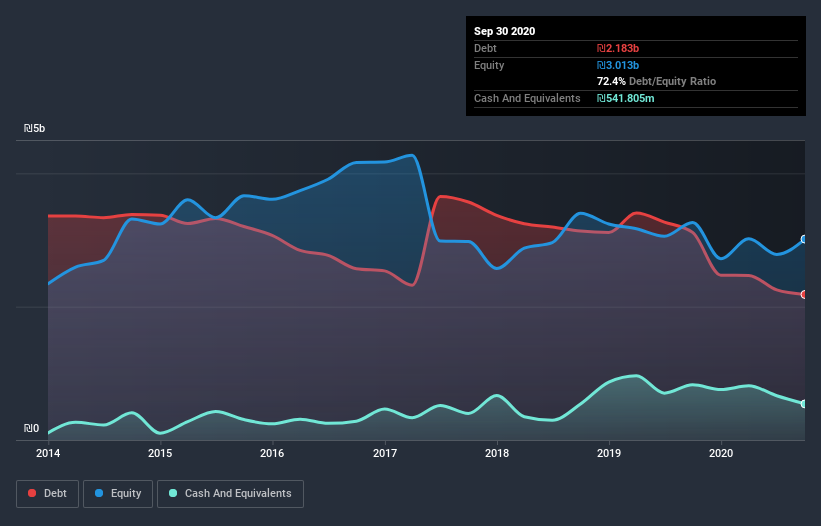
Warren Buffett famously said, 'Volatility is far from synonymous with risk.' So it seems the smart money knows that debt - which is usually involved in bankruptcies - is a very important factor, when you assess how risky a company is. As with many other companies Naphtha Israel Petroleum Corp. Ltd. (TLV:NFTA) makes use of debt. But is this debt a concern to shareholders?
What Risk Does Debt Bring?
Debt is a tool to help businesses grow, but if a business is incapable of paying off its lenders, then it exists at their mercy. If things get really bad, the lenders can take control of the business. However, a more common (but still painful) scenario is that it has to raise new equity capital at a low price, thus permanently diluting shareholders. Of course, debt can be an important tool in businesses, particularly capital heavy businesses. When we think about a company's use of debt, we first look at cash and debt together.
View our latest analysis for Naphtha Israel Petroleum
What Is Naphtha Israel Petroleum's Net Debt?
The image below, which you can click on for greater detail, shows that Naphtha Israel Petroleum had debt of ₪2.18b at the end of September 2020, a reduction from ₪3.11b over a year. On the flip side, it has ₪541.8m in cash leading to net debt of about ₪1.64b.

How Strong Is Naphtha Israel Petroleum's Balance Sheet?
We can see from the most recent balance sheet that Naphtha Israel Petroleum had liabilities of ₪617.9m falling due within a year, and liabilities of ₪2.20b due beyond that. Offsetting this, it had ₪541.8m in cash and ₪374.0m in receivables that were due within 12 months. So its liabilities total ₪1.90b more than the combination of its cash and short-term receivables.
When you consider that this deficiency exceeds the company's ₪1.50b market capitalization, you might well be inclined to review the balance sheet intently. In the scenario where the company had to clean up its balance sheet quickly, it seems likely shareholders would suffer extensive dilution.
We use two main ratios to inform us about debt levels relative to earnings. The first is net debt divided by earnings before interest, tax, depreciation, and amortization (EBITDA), while the second is how many times its earnings before interest and tax (EBIT) covers its interest expense (or its interest cover, for short). The advantage of this approach is that we take into account both the absolute quantum of debt (with net debt to EBITDA) and the actual interest expenses associated with that debt (with its interest cover ratio).
Naphtha Israel Petroleum's net debt is only 1.1 times its EBITDA. And its EBIT covers its interest expense a whopping 51.4 times over. So we're pretty relaxed about its super-conservative use of debt. On the other hand, Naphtha Israel Petroleum's EBIT dived 18%, over the last year. We think hat kind of performance, if repeated frequently, could well lead to difficulties for the stock. The balance sheet is clearly the area to focus on when you are analysing debt. But it is Naphtha Israel Petroleum's earnings that will influence how the balance sheet holds up in the future. So when considering debt, it's definitely worth looking at the earnings trend. Click here for an interactive snapshot.
Finally, a business needs free cash flow to pay off debt; accounting profits just don't cut it. So it's worth checking how much of that EBIT is backed by free cash flow. Happily for any shareholders, Naphtha Israel Petroleum actually produced more free cash flow than EBIT over the last three years. That sort of strong cash generation warms our hearts like a puppy in a bumblebee suit.
Our View
While Naphtha Israel Petroleum's EBIT growth rate has us nervous. To wit both its interest cover and conversion of EBIT to free cash flow were encouraging signs. When we consider all the factors discussed, it seems to us that Naphtha Israel Petroleum is taking some risks with its use of debt. So while that leverage does boost returns on equity, we wouldn't really want to see it increase from here. When analysing debt levels, the balance sheet is the obvious place to start. However, not all investment risk resides within the balance sheet - far from it. Be aware that Naphtha Israel Petroleum is showing 2 warning signs in our investment analysis , you should know about...
If, after all that, you're more interested in a fast growing company with a rock-solid balance sheet, then check out our list of net cash growth stocks without delay.
If you’re looking to trade Naphtha Israel Petroleum, open an account with the lowest-cost* platform trusted by professionals, Interactive Brokers. Their clients from over 200 countries and territories trade stocks, options, futures, forex, bonds and funds worldwide from a single integrated account. Promoted
Valuation is complex, but we're here to simplify it.
Discover if Naphtha Israel Petroleum might be undervalued or overvalued with our detailed analysis, featuring fair value estimates, potential risks, dividends, insider trades, and its financial condition.
Access Free AnalysisThis article by Simply Wall St is general in nature. It does not constitute a recommendation to buy or sell any stock, and does not take account of your objectives, or your financial situation. We aim to bring you long-term focused analysis driven by fundamental data. Note that our analysis may not factor in the latest price-sensitive company announcements or qualitative material. Simply Wall St has no position in any stocks mentioned.
*Interactive Brokers Rated Lowest Cost Broker by StockBrokers.com Annual Online Review 2020
Have feedback on this article? Concerned about the content? Get in touch with us directly. Alternatively, email editorial-team@simplywallst.com.
About TASE:NFTA
Naphtha Israel Petroleum
Engages in the exploration, development, production, and sale of oil and gas in Israel and the United States.
Excellent balance sheet and fair value.
Market Insights
Community Narratives





